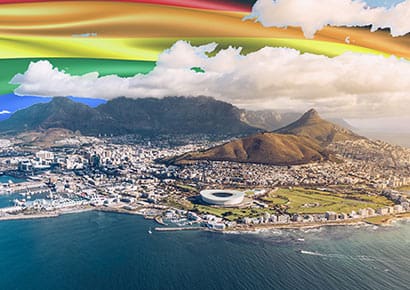SA’s LGBT community still faces high levels of violence
 A report has found that black LGBT South Africans face the highest risk of violence while the Western Cape is the most “out’ province in the country.
A report has found that black LGBT South Africans face the highest risk of violence while the Western Cape is the most “out’ province in the country.
We’re queer and we’re here! is the declarative title of a new report on lesbian, gay, bisexual and transgender (LGBT) South Africans which reveals that while tolerance is rising, being part of this at least 800 000-strong community often comes at devastating, sometimes fatal, cost.
A staggering four out of ten LGBT South Africans know of someone who has been murdered “for being or suspected of being” lesbian, gay, bisexual or transgender.
Black members of this community are twice as likely (49%) as white respondents (26%) to know of someone who was murdered on these grounds.
The risks are particularly high for black LGBT people in rural areas.
The research, drawing on a range of sources, is contained in the latest monthly edition of Fast Facts released today by the Centre for Risk Analysis at the South African Institute of Race Relations (IRR).
It shows that only half of black LGBT people are completely open about their sexuality.
IRR analyst and author of the report, Gerbrandt van Heerden, writes: “Black LGBT people are more likely to be victims of physical violence than those in the other race groups – this could possibly add to the reluctance by many to reveal their sexuality.”
The fear associated with “coming out” suggests that the tally of nearly 800 000 South Africans who identify as members of the LGBT community is “most certainly an undercount”.
The report acknowledges “a growing trend” of tolerance and “open-mindedness”. A majority of South Africans support constitutional protections for LGBT people and display high levels of tolerance for their gay neighbours, while, across Africa, younger and better-educated people are increasingly tolerant.
The research also touches on the under-researched but likely significant economic impact of the LGBT community’s purchasing power, the so-called “Pink Rand”.
But the greater emphasis is on the discrimination against and risks confronted by lesbian, gay, bisexual and transgender people.
Culture, race and geography all play a part in colouring the LGBT experience.
While LGBT individuals – 55% of black, 66% of coloured, 52% of Indian/Asian and 74% of white respondents – “are more likely than not to be completely open about their sexuality”, this willingness is not universally true.
Van Heerden notes that while LGBT rights are entrenched in South Africa’s Constitution, this protection “is not always guaranteed”.
Intolerance measured in the research ranges from verbal insults and threats of physical violence to being chased or followed, having objects thrown at them, personal property and possessions being damaged or destroyed, being punched, hit, kicked or beaten, experiencing violence or physical abuse from a family member and being sexually abused or raped.
Black LGBT individuals appear most likely to be victims of physical violence (8%, against 7% nationally); white individuals appear most likely to be verbally insulted (45% against 39% nationally); and Indian/Asian individuals appear most likely to experience violence or physical abuse from a family member (11% against 7% nationally).
Where you live matters, too.
LGBT people in the Western Cape are most likely to be completely open about their sexuality (70%, compared to 57% nationally), followed by Gauteng (60%) – the only two provinces above the national average. LGBT individuals in Limpopo are least likely to be open (35%).
The Eastern Cape emerges as the province where violence against LGBT people is most common – 15% against the national average of 6% – and where the highest number of respondents (48%) reported knowing someone who was murdered for being or suspected of being part of the LGBT community.
Yet, the majority of South Africans (50.6%) either agree or strongly agree that gay and lesbian citizens should have the same human rights as the rest of the population.
Six out of ten South Africans know someone who is gay or lesbian, and some 61% disagree or strongly disagree that being gay, lesbian, bisexual, transgender, or intersex should be a crime.
Compared to a range of other African states, South Africans are twice as likely (40%) to agree that gay marriage should be legal.
A section of the report – “Out in Africa” – assesses continental tolerance, finding that education plays a crucial role in the perception of homosexuality, with tolerance for homosexuals being highest (31%) among people with a university degree.
South Africa, at 67%, comes second to Cape Verde (74%) in demonstrating high tolerance to having LGBT neighbours. Senegal (3%) is last in class.
Across the board in Africa, tolerance of “homosexuals and other groups” ranks well below tolerance of ethnicity, religion, immigrants and people living with HIV/Aids. In Southern Africa, which – out of five African regions – has the highest tolerance of homosexuals (32%), the tally falls far short of tolerance for ethnicity (88%), religion (88%), immigrants (74%) and people living with HIV/Aids (79%). East Africa is least tolerant of homosexuals (12%).
Michael Morris is head of media at the IRR, a liberal think tank that promotes political and economic freedom. This article was first published by News24.
- Facebook Messenger
- Total111
On Sunday the 28th of November 2017, I found Trey dead in his apartment. He was under the bed covered with a curtain. I called the cops, friends and family members immediately. It took the forensics 6hrs to sort out the situation. We suspect the so called lover murdered him. On 3rd of December 2017, we laid him to rest. I’m not ok, we’re not ok, and we won’t be ok for quite a while. Gay people are getting murdered everyday and something drastic needs to be done!!